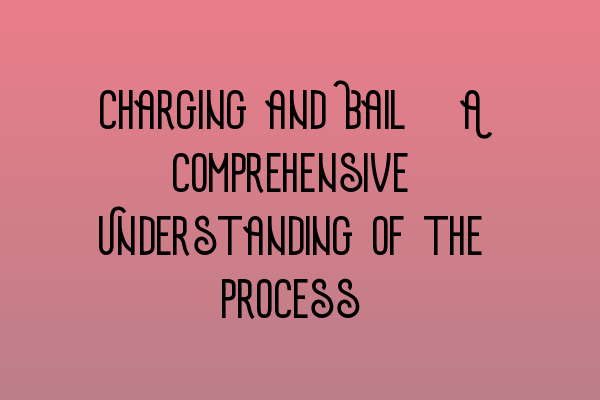Charging and Bail: A Comprehensive Understanding of the Process
When it comes to criminal law, one of the key stages in the legal process is charging and bail. Understanding how this process works is crucial for both aspiring solicitors and individuals who find themselves caught in the criminal justice system. In this article, we will provide a comprehensive overview of the charging and bail process, exploring its intricacies and importance.
The Charging Process
The charging process refers to the formal act of accusing an individual of a criminal offense. This occurs after the police have conducted an investigation and gathered sufficient evidence to support the belief that a crime has been committed. The decision to charge someone with a crime lies in the hands of the Crown Prosecution Service (CPS), who assess the evidence provided by the police and determine if there is a realistic prospect of conviction.
It is important to note that the charging process is not arbitrary. The CPS must base their decision on the Full Code Test, which requires evidence that is both reliable and admissible in court. This ensures that individuals are not unjustly accused and the charging process maintains its integrity.
Once the CPS has made the decision to charge an individual, they are formally notified of the offenses they are accused of. This is typically done through the issuance of a Charging Document, which outlines the specific charges and provides details of when and where the individual is required to appear in court.
The Role of Bail
After an individual has been charged, the next step in the legal process is determining whether they should be released on bail or detained in custody until their trial. Bail serves as a mechanism to secure an individual’s presence at court while allowing them to remain in the community during the legal proceedings.
When making a decision on bail, the court takes into consideration various factors such as the seriousness of the offense, the individual’s criminal history, their ties to the community, and the likelihood of them absconding or interfering with the course of justice. The primary objective of bail is to balance the interests of justice with the rights and freedoms of the individual.
There are several types of bail that can be granted:
- Police Bail: This is granted by the police prior to the individual’s appearance in court. It allows them to remain in the community under certain conditions until their court date.
- Court Bail: This is granted by the court during the initial hearing. The court may impose additional conditions such as surrendering their passport or reporting to a police station.
- Conditional Bail: This is granted with specific conditions such as attending drug rehabilitation programs or reporting to a probation officer.
- Unconditional Bail: This is granted with no specific conditions for release.
While bail is generally the preferred outcome, there are circumstances where an individual may be remanded in custody. This is usually the case when there is a significant risk of the individual committing further offenses or failing to appear in court.
The Importance of Charging and Bail
The charging and bail process plays a critical role in the criminal justice system. It ensures that individuals charged with crimes are made aware of the charges against them and are given the opportunity to prepare and present their defense. Bail allows individuals to maintain their livelihoods, relationships, and access to legal representation while their case is awaiting trial.
By understanding the charging and bail process, aspiring solicitors can better support their clients and navigate the complexities of criminal law. It is important to stay up-to-date with changes in legislation and case law to provide the best legal advice possible.
To further enhance your knowledge in the field of criminal law, check out our related articles:
- SQE Exam Prep: Essential Study Materials for Aspiring Solicitors
- Demystifying the Solicitors Qualifying Examination Format
- SQE Exam for International Lawyers: Challenges and Success Strategies
- LLC Formation Made Simple: Step-by-Step Guide for UK Entrepreneurs
- LLC Formation: A Step-by-Step Guide for UK Entrepreneurs
At SQE Criminal Law & Practice Law UK, we are committed to providing comprehensive resources and expert guidance to aspiring solicitors. Stay tuned for more informative articles on criminal law and practice.
